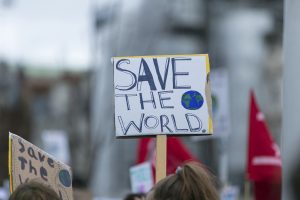In some commentaries, authoritarianism and one-party rule, particularly China’s model of governance, is often portrayed as a magic bullet solution to the ostensible impending doom of climate change. In lieu of impotent governance, electoral cycles, short term policies, and hot-air promises of economic and environmental solutions, top-down authoritarian governance is touted as possessing the ability to implement the prudent and long-term policy capable of mitigating the worst effects of climate change.
This type of rhetoric is especially salient in authoritarian state-owned media around the world. Liberal democracies and the West, in particular, are portrayed as decadent, inefficient, dysfunctional, and archaic. Western governance models are seen as unable to meet the needs of the 21st century; they are ill-equipped to meet the social and economic needs of a growing population while mitigating the worst effects of climate change. Chinese state news agency Xinhua recently wrote of the United States’ “four deficits in climate action,” detailing the way in which inconsistency and “flip-flopping” has been the hallmark of U.S. climate policy. This view was further reaffirmed with the dramatic reversal of the Biden administration in re-joining the 2015 Paris Agreement after Donald Trump’s tumultuous exit in 2016. How are we to rely on capricious democracies when dealing with such a time-sensitive issue? Instead, China’s leadership is supposed to offer a decisive system of governance that is committed to “harmony between man and nature” and “green development.”
Indeed, these ideals are now enshrined in China’s Belt and Road Initiative (BRI). As Xi Jinping stated at the Leaders Climate Summit: “China has made ecological cooperation a key part of Belt and Road cooperation.” However, authoritarian state planning and top-down policies such as the BRI are not as omnipotent as often perceived. There is ample evidence to suggest the BRI is a fragmented, poorly planned, and ill-received initiative. In fact, the policy suffers from what some scholars have termed “fragmented authoritarianism.” BRI planning documents lack definition, are extremely “loose,” and BRI implementation is incredibly uncoordinated, with competing state agencies interpreting the vague rhetoric of the BRI for their own interests, often undermining the Party’s diplomatic objectives. Thus, if the BRI is to be understood as the ne plus ultra of authoritarian governments’ technocratic capability to implement policy decisively and successfully, it is not a very convincing one.
Overzealous enthusiasm for authoritarianism’s ostensible capacity to mitigate anthropogenic climate change also overlooks the importance of bottom-up and grassroots campaigns in stimulating public discussion and achieving climate justice and protection. Indeed, without the cumulative checks-and-balances of investigative journalism, activists, public figures, and NGOs, authoritarian governments do not face the same pressures or incentives familiar to democratic governments.
Civil society provides the impetus for climate policy. For example, the landmark 2013 Urgenda Foundation v. State of the Netherlands case was a legal battle between a climate activist group and their respective government. The activists successfully sued the Dutch state on the grounds of violating the European Convention on Human Rights for failing to implement policy that would ensure sufficient reductions of greenhouse gas emissions. Their success galvanized global civil society, and similar cases were heard in countries such as New Zealand, Ireland, Norway, Belgium, the United Kingdom, Germany, France, and Switzerland.
Advocates of the authoritarian model also overlook the agency that various sub-state and non-state actors possess in the mitigation of climate change. As perturbing as Trump’s exit from the 2015 Paris Agreement was, we also witnessed the collective agency of relatively autonomous cities in reaffirming their commitments to the Paris Agreement. Mayors from Los Angeles to New York City were animated in their objective of realizing the goals of the Paris Agreement, no matter what choices Washington made.
Without freedom of expression or freedom of the press, an active civil society cannot flourish, and meaningful debate regarding climate change remains stagnant and controlled by censorship. That was the case with the Chinese schoolgirl who was inspired by the global “Fridays for Future” campaign: Ou Hongyi’s protests were swiftly suppressed when told she could not return to school unless she “ditched” her climate activism.
If indeed there does exist a pathway out of global climate governance gridlock, the answer does not lie at the feet of authoritarian monoliths. Regardless of the inertia of authoritarian policy and the lack of civil society, an unwavering confidence in authoritarianism also overlooks how integral greenhouse gas-intensive industry is to performance legitimacy. Without electoral legitimacy, a sudden and decisive break away from this model of economic growth could jeopardize the credibility of one-party rule. This is a prospect most authoritarian leaders would wish to avoid.
Instead, we must look elsewhere for solutions. Most importantly, in addition to effective policy, the encouragement of transparent policy decisions, freedom of expression and freedom of the press are all absolutely fundamental to mitigating the worst effects of climate change.

































